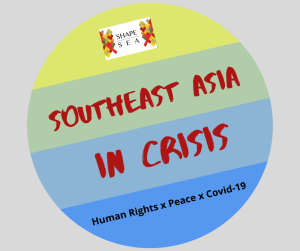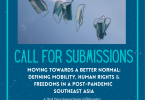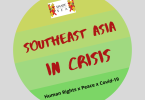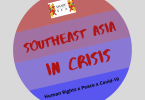Patricia MirandaPatricia Miranda is the Policy Advocacy Lead of Oxfam Pilipinas. Oxfam is an international confederation of 20 organizations working together with partners and local communities in more than 90 countries. Oxfam has been working in the Philippines for 30 years to address poverty’s underlying causes through its various programs on economic justice, conflict transformation, gender justice, and humanitarian response. See: https://philippines.oxfam.org/
 The Philippines has had one of the “strictest and longest” domestic containment measures to address Covid-19 (Armas 2020). Almost seven months on, this unenviable title continues amid curfews, limited public transportation, additional roadblocks, checkpoints, social media monitoring by the police (Liboro 2020), and additional police deployments in business districts (Caliwan 2020). Despite (or, arguably, because of) these measures, the Philippines still has the highest Covid-19 incidence in Southeast Asia based on data from Johns Hopkins University and Southeast Asian Health Ministries (2020). The Lancet, an international medical journal, has given the Philippines a dismal ranking of 66 out of 91 countries in terms of measures to suppress the spread of the disease (Sachs et al. 2020).While wartime rhetoric, including calls for ‘obedience,’ have been used to justify draconian Covid-19 strategies (Aguilar 2020; Santamaria 2020), there is plenty of evidence in the Philippines and elsewhere in the region that highly securitized responses to this multi-dimensional public health crisis deters health-seeking behavior due to stigmatization and fear of punishment for actual, or even perceived, violations (see Abo and Ayao 2020; Barredo 2020; Catolico 2020). Narratives of people and communities’ lived experiences in Southeast Asia show that militarized responses are not just harmful, but deadly in contexts where there are pre-existing social inequalities and weak socio-economic and legal safeguards (Barredo 2020; Chen 2020; Miranda and Angkaya-Kuhutan 2020).Leveraging local mechanisms and interventionsIn the Philippines, the pandemic comes at the heels of several humanitarian emergencies, including earthquakes, typhoons, a volcanic eruption, and ongoing armed conflict in the southern Philippines. In May 2020, Oxfam Pilipinas, together with 21 organizations, conducted a Covid-19 rapid gender assessment (RGA) survey among 900 respondents from urban poor and rural communities in the Philippines across six administrative regions. Sixty percent of the respondents reported that Covid-19 had negative impacts on their incomes and their mobility. The RGA results showed that vulnerable women and girls have been negatively impacted the most as they put in additional hours of unpaid care work in contexts worsened by humanitarian responses that are not gender-responsive. The findings affirm that women living in poverty are particularly hit the hardest by health emergencies and humanitarian crises (Ampilan 2020; Aranas 2020).The RGA results also confirm that communities (see Niederberger et al. 2019), not the police or armed forces, can play a much more significant role in the rights-based and health-focused containment, control, prevention, and management of COVID-19. For example, 80% of the RGA respondents confirmed that it is easiest to access the barangay (village) health center and secure health-related information. The majority of the respondents also reported that barangay-level interventions had provided food, medicines, and livelihoods. On the other hand, national and municipal agencies provided short-term support of food and medicines only (Kindipan-Dulawan & Esturas, 2020).Respondents have also explicitly identified barangay processes as a more trustworthy response to violence against women and girls compared to other municipal or national mechanisms. Further, 40% percent of the respondents also said that they would report gender-based violence to barangay authorities or leaders, while only 26% said they would report to the police (Dulawan & Esturas, 2020).Mobilize communities, not the military These findings matter. Affected communities are experts on their specific contexts, and their perspectives and insights are crucial to developing sustainable and feasible long-term solutions. Barangay or village leaders and health workers will be better equipped to identify and understand their community’s shared norms and values. This, in turn, may help improve response strategies, allow for context-sensitive risk mitigation, and strengthening community resilience during emergencies and crises (see Ampilan 2020; Niederberger et al. 2019).A rights-based approach (as opposed to a securitized or militarized approach) to health requires that policies and programs, and their implementation, must place the needs of those furthest behind first to achieve fundamental equity. This principle has been echoed in the 2030 Agenda for Sustainable Development and Universal Health Coverage. Together with 192 other states, including all ASEAN member states, the Philippines committed to achieving the Sustainable Development Goals by 2030, which includes ensuring universal health coverage and access to safe and effective medicines and vaccines.Interrogating ‘resilience’While it may be true that extraordinary collective efforts are needed in these extraordinary times, response actions should not lead to diminishing the dignity and agency of affected communities who are dealing with multiple threats and risks alongside Covid-19. Therefore, it is vital to interrogate how ‘resilience’ is framed and claimed, especially when weaponized to justify the use of force. Resilience narratives cannot be genuine if used to silence those who are suffering or unable to cope or to erase the stories of those who do not survive the pandemic. Further, depictions of ‘resilience’ should not reinforce gender stereotypes or gendered inequalities, or be used as a cover-up for disaster governance accountability gaps.A ‘better normal,’ which indicates a vastly different way of doing things, has been the clarion call among civil society groups and advocates pushing for a healthy, equitable, sustainable, feminist future in the Philippines (Oxfam Pilipinas et al. 2020) This, however, can only be achieved when the most affected people and communities are at the heart and start of all decisions and response actions that affect them.References Abo, Noraida, and Abie Ayao. 2020. The New Humanitarian | After Ceasefire Failures, Mindanao ™s Displaced Women and Girls Are Caught between Conflict and Coronavirus. Retrieved September 24, 2020 (https://www.thenewhumanitarian.org/opinion/2020/06/01/Philippines-Mindanao-coronavirus-violence-women-girls).Aguilar, Krissy. 2020. Duterte: Lockdowns, Public Obedience Helped Flatten PH ™s COVID-19 Curve. INQUIRER.Net, September 7. Retrieved September 24, 2020 (https://newsinfo.inquirer.net/1332473/duterte-lockdowns-public-obedience-helped-flatten-phs-covid-19-curve).Ampilan, Duoi. 2020. Communities at the Frontlines of Beating COVID-19. SHAPE-SEA. Retrieved September 24, 2020 (https://shapesea.com/op-ed/covid-19/communities-at-the-frontlines-of-beating-covid-19/).Aranas, Mark Vincent. 2020. Reducing the Weight on Women ™s Shoulders. Retrieved September 24, 2020 (https://shapesea.com/op-ed/covid-19/reducing-the-weight-on-womens-shoulders/).Armas, Sara Gomez. 2020. At Six Months, Manila Enters World ™s Longest COVID-19 Quarantine. Agencia EFE, September 15.Barredo, Joel Mark. 2020. Problematizing the Securitization of Covid-19 in Southeast Asia: A Necessary Step Towards an Inclusive, Rights-Centred Normal. SHAPE-SEA. Retrieved September 24, 2020 (https://shapesea.com/op-ed/covid-19/problematizing-the-securitization-of-covid-19-in-southeast-asia-a-necessary-step-towards-an-inclusive-rights-centred-normal/).Caliwan, Christopher Lloyd. 2020. Police Visibility Assured as More Businesses Reopen Tuesday. Philippine News Agency, August 31. Retrieved September 24, 2020 (https://www.pna.gov.ph/articles/1113917).Catolico, Gianna Francesca. 2020. From ˜Very Important Politicians ™ to ˜Very Insinuating Patients. ™ SHAPE-SEA. Retrieved September 24, 2020 (https://shapesea.com/op-ed/covid-19/from-very-important-politicians-to-very-insinuating-patients/).Chen, Lili. 2020. Securitization of COVID-19 In Timor-Leste: A Gender Perspective. SHAPE-SEA. Retrieved September 28, 2020 (https://shapesea.com/op-ed/covid-19/securitization-of-covid-19-in-timor-leste-a-gender-perspective/).ins University. 2020. COVID-19 Dashboard by the Center for Systems Science and Engineering at Johns Hopkins University. Johns Hopkins Coronavirus Resource Center. Retrieved September 24, 2020 (https://coronavirus.jhu.edu/map.html).Liboro, Raymund. 2020. Statement of Privacy Commissioner Raymund Liboro on the PNP Plan to Monitor Social Media for Quarantine Violators. National Privacy Commission, September 7. Retrieved September 24, 2020 (https://www.privacy.gov.ph/2020/09/statement-of-privacy-commissioner-raymund-liboro-on-the-pnp-plan-to-monitor-social-media-for-quarantine-violators/).Kindipan-Dulawan, Jeanette, and Erielle Esturas. 2020. Covid-19 Rapid Gender Assessment: Initial Findings and Analysis as of July 2020. Oxfam Pilipinas. Forthcoming.Miranda, Patricia, and Salma Angkaya-Kuhutan. 2020. Legal Preparedness during ˜Business Unusual ™ | Inquirer Opinion. Retrieved September 24, 2020 (https://opinion.inquirer.net/129753/legal-preparedness-during-business-unusual).Niederberger, Eva, Lucy Knight, and Marion O ™Reilly. 2019. An Introduction to Community Engagement in WASH | Oxfam Policy & Practice. Policy & Practice. Retrieved September 24, 2020 (https://policy-practice.oxfam.org.uk/publications/*).Oxfam Pilipinas, Action for Economic Reforms, Social Watch Philippines, and National Rural Women Coalition. September 2020. A Better Normal: Civil Society Reflections on Covid-19. Podcast.Sachs, Jeffrey D., Salim Abdool Karim, Lara Aknin, Joseph Allen, Kirsten Brosbøl, Gabriela Cuevas Barron, Peter Daszak, MarÃa Fernanda Espinosa, Vitor Gaspar, Alejandro Gaviria, Andy Haines, Peter Hotez, Phoebe Koundouri, Felipe LarraÃn Bascuñán, Jong-Koo Lee, Muhammad Pate, Paul Polman, Srinath Reddy, Ismail Serageldin, Raj Shah, John Thwaites, Vaira Vike-Freiberga, Chen Wang, Miriam Khamadi Were, Lan Xue, Min Zhu, Chandrika Bahadur, Maria Elena Bottazzi, Yanis Ben Amor, Lauren Barredo, Ozge Karadag Caman, Guillaume Lafortune, Emma Torres, Ismini Ethridge, and Juliana G. E. Bartels. 2020. Lancet COVID-19 Commission Statement on the Occasion of the 75th Session of the UN General Assembly. The Lancet 0(0). doi: 10.1016/S0140-6736(20)31927-9.Santamaria, Bryan Thomas. 2020. A Dangerous Message: Problematic Implications of the Military Responses to COVID-19 in the Philippines – SHAPE-SEA. SHAPE-SEA. Retrieved September 24, 2020 (https://shapesea.com/op-ed/covid-19/a-dangerous-message-problematic-implications-of-the-military-responses-to-covid-19-in-the-philippines/).
The Philippines has had one of the “strictest and longest” domestic containment measures to address Covid-19 (Armas 2020). Almost seven months on, this unenviable title continues amid curfews, limited public transportation, additional roadblocks, checkpoints, social media monitoring by the police (Liboro 2020), and additional police deployments in business districts (Caliwan 2020). Despite (or, arguably, because of) these measures, the Philippines still has the highest Covid-19 incidence in Southeast Asia based on data from Johns Hopkins University and Southeast Asian Health Ministries (2020). The Lancet, an international medical journal, has given the Philippines a dismal ranking of 66 out of 91 countries in terms of measures to suppress the spread of the disease (Sachs et al. 2020).While wartime rhetoric, including calls for ‘obedience,’ have been used to justify draconian Covid-19 strategies (Aguilar 2020; Santamaria 2020), there is plenty of evidence in the Philippines and elsewhere in the region that highly securitized responses to this multi-dimensional public health crisis deters health-seeking behavior due to stigmatization and fear of punishment for actual, or even perceived, violations (see Abo and Ayao 2020; Barredo 2020; Catolico 2020). Narratives of people and communities’ lived experiences in Southeast Asia show that militarized responses are not just harmful, but deadly in contexts where there are pre-existing social inequalities and weak socio-economic and legal safeguards (Barredo 2020; Chen 2020; Miranda and Angkaya-Kuhutan 2020).Leveraging local mechanisms and interventionsIn the Philippines, the pandemic comes at the heels of several humanitarian emergencies, including earthquakes, typhoons, a volcanic eruption, and ongoing armed conflict in the southern Philippines. In May 2020, Oxfam Pilipinas, together with 21 organizations, conducted a Covid-19 rapid gender assessment (RGA) survey among 900 respondents from urban poor and rural communities in the Philippines across six administrative regions. Sixty percent of the respondents reported that Covid-19 had negative impacts on their incomes and their mobility. The RGA results showed that vulnerable women and girls have been negatively impacted the most as they put in additional hours of unpaid care work in contexts worsened by humanitarian responses that are not gender-responsive. The findings affirm that women living in poverty are particularly hit the hardest by health emergencies and humanitarian crises (Ampilan 2020; Aranas 2020).The RGA results also confirm that communities (see Niederberger et al. 2019), not the police or armed forces, can play a much more significant role in the rights-based and health-focused containment, control, prevention, and management of COVID-19. For example, 80% of the RGA respondents confirmed that it is easiest to access the barangay (village) health center and secure health-related information. The majority of the respondents also reported that barangay-level interventions had provided food, medicines, and livelihoods. On the other hand, national and municipal agencies provided short-term support of food and medicines only (Kindipan-Dulawan & Esturas, 2020).Respondents have also explicitly identified barangay processes as a more trustworthy response to violence against women and girls compared to other municipal or national mechanisms. Further, 40% percent of the respondents also said that they would report gender-based violence to barangay authorities or leaders, while only 26% said they would report to the police (Dulawan & Esturas, 2020).Mobilize communities, not the military These findings matter. Affected communities are experts on their specific contexts, and their perspectives and insights are crucial to developing sustainable and feasible long-term solutions. Barangay or village leaders and health workers will be better equipped to identify and understand their community’s shared norms and values. This, in turn, may help improve response strategies, allow for context-sensitive risk mitigation, and strengthening community resilience during emergencies and crises (see Ampilan 2020; Niederberger et al. 2019).A rights-based approach (as opposed to a securitized or militarized approach) to health requires that policies and programs, and their implementation, must place the needs of those furthest behind first to achieve fundamental equity. This principle has been echoed in the 2030 Agenda for Sustainable Development and Universal Health Coverage. Together with 192 other states, including all ASEAN member states, the Philippines committed to achieving the Sustainable Development Goals by 2030, which includes ensuring universal health coverage and access to safe and effective medicines and vaccines.Interrogating ‘resilience’While it may be true that extraordinary collective efforts are needed in these extraordinary times, response actions should not lead to diminishing the dignity and agency of affected communities who are dealing with multiple threats and risks alongside Covid-19. Therefore, it is vital to interrogate how ‘resilience’ is framed and claimed, especially when weaponized to justify the use of force. Resilience narratives cannot be genuine if used to silence those who are suffering or unable to cope or to erase the stories of those who do not survive the pandemic. Further, depictions of ‘resilience’ should not reinforce gender stereotypes or gendered inequalities, or be used as a cover-up for disaster governance accountability gaps.A ‘better normal,’ which indicates a vastly different way of doing things, has been the clarion call among civil society groups and advocates pushing for a healthy, equitable, sustainable, feminist future in the Philippines (Oxfam Pilipinas et al. 2020) This, however, can only be achieved when the most affected people and communities are at the heart and start of all decisions and response actions that affect them.References Abo, Noraida, and Abie Ayao. 2020. The New Humanitarian | After Ceasefire Failures, Mindanao ™s Displaced Women and Girls Are Caught between Conflict and Coronavirus. Retrieved September 24, 2020 (https://www.thenewhumanitarian.org/opinion/2020/06/01/Philippines-Mindanao-coronavirus-violence-women-girls).Aguilar, Krissy. 2020. Duterte: Lockdowns, Public Obedience Helped Flatten PH ™s COVID-19 Curve. INQUIRER.Net, September 7. Retrieved September 24, 2020 (https://newsinfo.inquirer.net/1332473/duterte-lockdowns-public-obedience-helped-flatten-phs-covid-19-curve).Ampilan, Duoi. 2020. Communities at the Frontlines of Beating COVID-19. SHAPE-SEA. Retrieved September 24, 2020 (https://shapesea.com/op-ed/covid-19/communities-at-the-frontlines-of-beating-covid-19/).Aranas, Mark Vincent. 2020. Reducing the Weight on Women ™s Shoulders. Retrieved September 24, 2020 (https://shapesea.com/op-ed/covid-19/reducing-the-weight-on-womens-shoulders/).Armas, Sara Gomez. 2020. At Six Months, Manila Enters World ™s Longest COVID-19 Quarantine. Agencia EFE, September 15.Barredo, Joel Mark. 2020. Problematizing the Securitization of Covid-19 in Southeast Asia: A Necessary Step Towards an Inclusive, Rights-Centred Normal. SHAPE-SEA. Retrieved September 24, 2020 (https://shapesea.com/op-ed/covid-19/problematizing-the-securitization-of-covid-19-in-southeast-asia-a-necessary-step-towards-an-inclusive-rights-centred-normal/).Caliwan, Christopher Lloyd. 2020. Police Visibility Assured as More Businesses Reopen Tuesday. Philippine News Agency, August 31. Retrieved September 24, 2020 (https://www.pna.gov.ph/articles/1113917).Catolico, Gianna Francesca. 2020. From ˜Very Important Politicians ™ to ˜Very Insinuating Patients. ™ SHAPE-SEA. Retrieved September 24, 2020 (https://shapesea.com/op-ed/covid-19/from-very-important-politicians-to-very-insinuating-patients/).Chen, Lili. 2020. Securitization of COVID-19 In Timor-Leste: A Gender Perspective. SHAPE-SEA. Retrieved September 28, 2020 (https://shapesea.com/op-ed/covid-19/securitization-of-covid-19-in-timor-leste-a-gender-perspective/).ins University. 2020. COVID-19 Dashboard by the Center for Systems Science and Engineering at Johns Hopkins University. Johns Hopkins Coronavirus Resource Center. Retrieved September 24, 2020 (https://coronavirus.jhu.edu/map.html).Liboro, Raymund. 2020. Statement of Privacy Commissioner Raymund Liboro on the PNP Plan to Monitor Social Media for Quarantine Violators. National Privacy Commission, September 7. Retrieved September 24, 2020 (https://www.privacy.gov.ph/2020/09/statement-of-privacy-commissioner-raymund-liboro-on-the-pnp-plan-to-monitor-social-media-for-quarantine-violators/).Kindipan-Dulawan, Jeanette, and Erielle Esturas. 2020. Covid-19 Rapid Gender Assessment: Initial Findings and Analysis as of July 2020. Oxfam Pilipinas. Forthcoming.Miranda, Patricia, and Salma Angkaya-Kuhutan. 2020. Legal Preparedness during ˜Business Unusual ™ | Inquirer Opinion. Retrieved September 24, 2020 (https://opinion.inquirer.net/129753/legal-preparedness-during-business-unusual).Niederberger, Eva, Lucy Knight, and Marion O ™Reilly. 2019. An Introduction to Community Engagement in WASH | Oxfam Policy & Practice. Policy & Practice. Retrieved September 24, 2020 (https://policy-practice.oxfam.org.uk/publications/*).Oxfam Pilipinas, Action for Economic Reforms, Social Watch Philippines, and National Rural Women Coalition. September 2020. A Better Normal: Civil Society Reflections on Covid-19. Podcast.Sachs, Jeffrey D., Salim Abdool Karim, Lara Aknin, Joseph Allen, Kirsten Brosbøl, Gabriela Cuevas Barron, Peter Daszak, MarÃa Fernanda Espinosa, Vitor Gaspar, Alejandro Gaviria, Andy Haines, Peter Hotez, Phoebe Koundouri, Felipe LarraÃn Bascuñán, Jong-Koo Lee, Muhammad Pate, Paul Polman, Srinath Reddy, Ismail Serageldin, Raj Shah, John Thwaites, Vaira Vike-Freiberga, Chen Wang, Miriam Khamadi Were, Lan Xue, Min Zhu, Chandrika Bahadur, Maria Elena Bottazzi, Yanis Ben Amor, Lauren Barredo, Ozge Karadag Caman, Guillaume Lafortune, Emma Torres, Ismini Ethridge, and Juliana G. E. Bartels. 2020. Lancet COVID-19 Commission Statement on the Occasion of the 75th Session of the UN General Assembly. The Lancet 0(0). doi: 10.1016/S0140-6736(20)31927-9.Santamaria, Bryan Thomas. 2020. A Dangerous Message: Problematic Implications of the Military Responses to COVID-19 in the Philippines – SHAPE-SEA. SHAPE-SEA. Retrieved September 24, 2020 (https://shapesea.com/op-ed/covid-19/a-dangerous-message-problematic-implications-of-the-military-responses-to-covid-19-in-the-philippines/).





